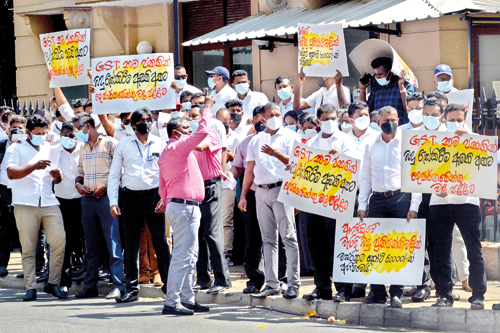Investors need confidence that Sri Lanka is a safe choice for investment!

Protests like this are a disincentive to investment.
The Sri Lankan economy is in the grips of a debt crisis. Sri Lanka’s debt-to-GDP ratio is above 100 per cent. However, the same can be said for many countries such as France, Japan, and the US. This begs the question what is really hurting the Sri Lankan economy? Yes, the currency played a role. However, the currency price is largely determined by the current state of the economy and the expectations about future investment opportunities.
Irresponsible fiscal spending is the key culprit behind the crisis. The foolish public expenditure undertaken by the current and previous administrations should bear the brunt of the blame. A simple understanding of the net present value (NPV) rule of investing is enough to make a good investment. The future benefits to the population should be discounted at a rate which considers unanticipated negative shocks to the economic system (eg a liquidity crisis or a demand shock). If the expected discounted benefits to the public outweigh the costs, then the government should take on the investment.
Now, one must ask the question, do investments such as the Hambantota Port and the Airport pass the NPV rule? Keep in mind that the real cost of such infrastructure projects exceeds the simple accounting costs. One should consider the opportunity costs of foregoing other viable investment opportunities. For example, the government could have considered creating a higher technical university system to keep par with the rapid scientific and technological advances around the globe.
Now that the economy is in tatters, policymakers should take careful steps to recover from the crisis reasonably quickly. A huge issue is the investor confidence in the economy. A series of steps should be undertaken to address the confidence issues.
First, the government needs to establish a special policing force to stop bribery and corruption and enforce contracts. There is ample evidence that countries with better legal protections promote better financial markets. The careful analysis in a series of papers by economists LaPorta, Lopez-de-Silanes, Shleifer, and Vishny show that legal protections and enforcements promote financial markets, which then foster economic growth. Without the enforcement of laws and regulations, there is no economic growth.
Second, the government should establish independent institutions administered by experts in the field. For example, the Central Bank should set monetary policy based on economic conditions. Other independent institutions (e.g., Treasury, Justice, and Commerce departments) should be established. In similar vein, the people should appoint new competent policymakers to the government. Investors are less likely to commit inherently riskier investments in an emerging market with an unstable political system and poor institutions.
Third, the excessive government debt needs to be reduced to a manageable level. The latest research shows that high government debt tends to reduce corporate investments. In a series of papers, economists Graham, Leary, and Roberts show that investors actively substitute between lending to government and corporate sectors.
This type of debt substitution can have long-term negative effects on the private firms. In a recent co-authored article, I show that increases in government debt reduced mergers and acquisitions (M&A) activity in the US. Excessive government debt hinders M&As because government debt increases fiscal policy-related uncertainty. The same issues we see in the US applies to Sri Lanka, perhaps even more so given the instability.
Sri Lanka is at crossroads. I believe that these simple, yet important steps can be used as a starting point in the road to recovery. Political and policy uncertainties need to be reduced to increase confidence in the economy and spur investment.
Hitad.lk has you covered with quality used or brand new cars for sale that are budget friendly yet reliable! Now is the time to sell your old ride for something more attractive to today's modern automotive market demands. Browse through our selection of affordable options now on Hitad.lk before deciding on what will work best for you!


